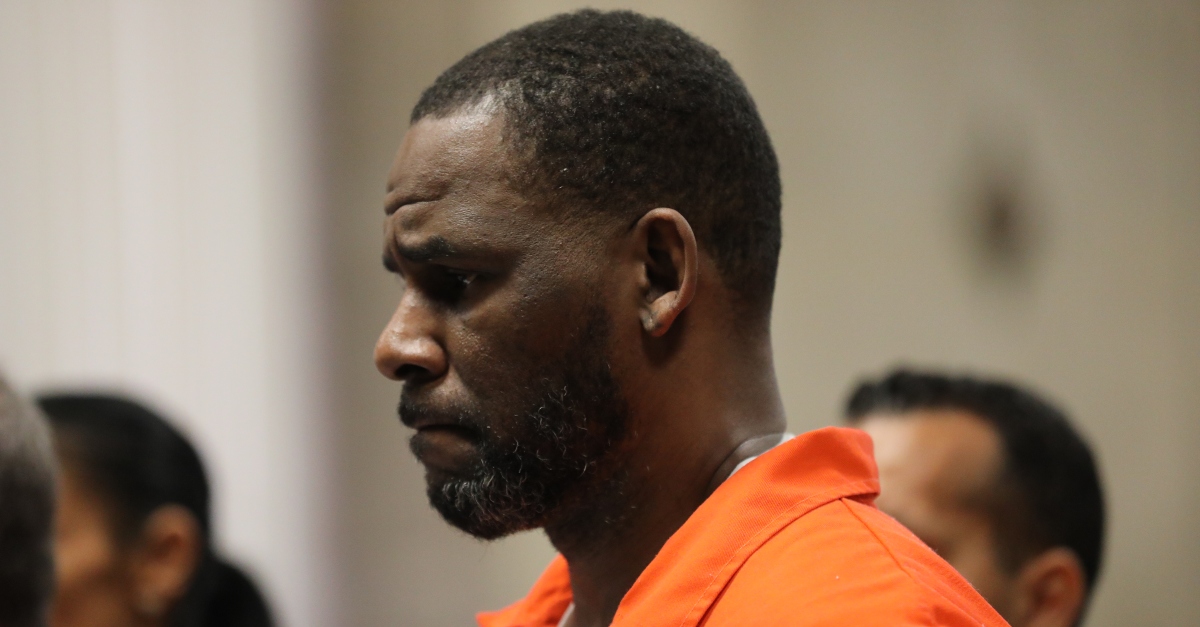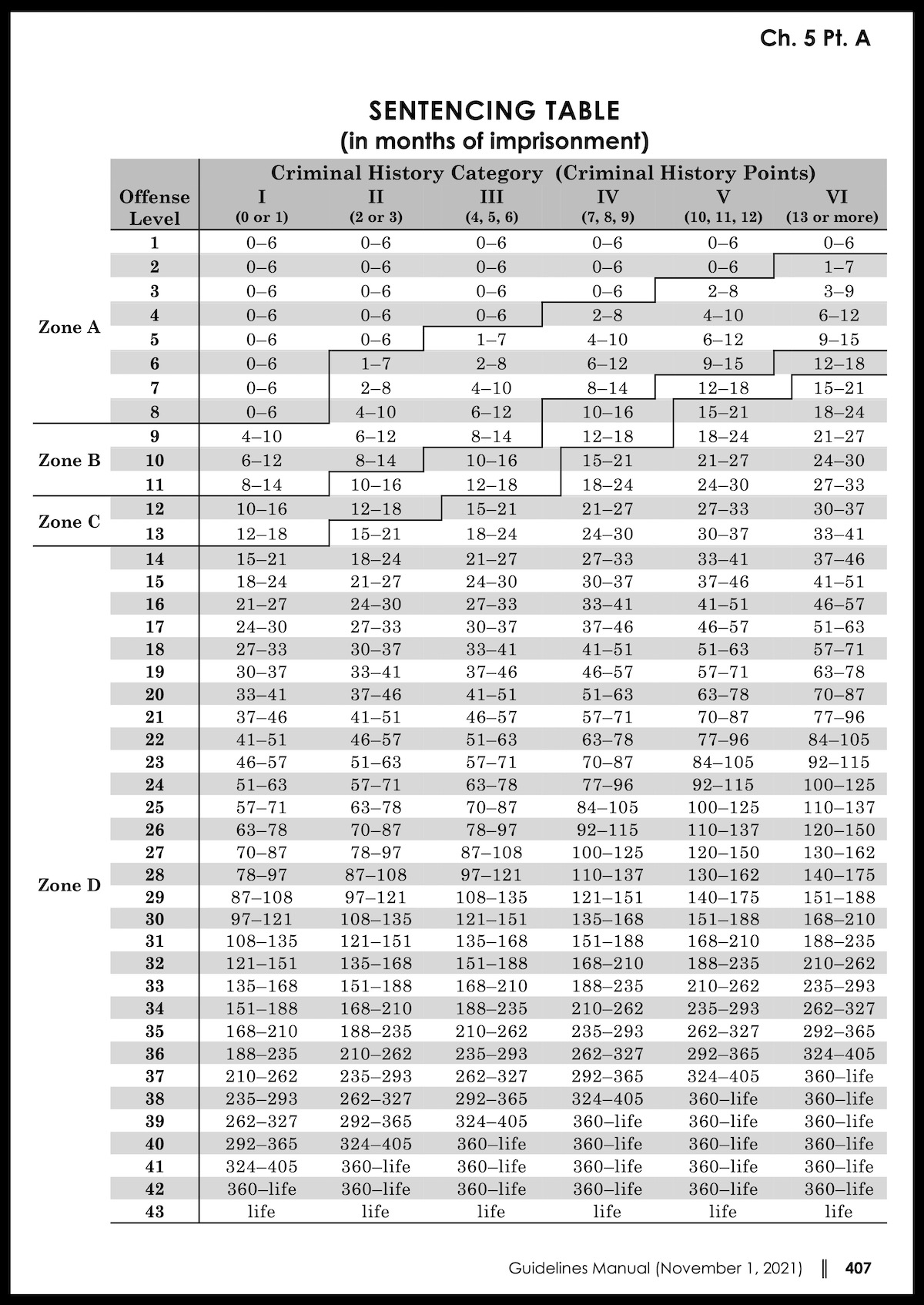
R. Kelly appears in an Illinois state courtroom in a 2019 file photo. (Image via Antonio Perez/pool via Getty Images.)
Federal prosecutors on Wednesday asked a U.S. District Court judge to sentence convicted sex trafficker R. Kelly to a prison sentence “in excess of 25 years.” That’s according to a federal sentencing memorandum.
“In light of the seriousness of the offenses, the need for specific deterrence and the need to protect the public from further crimes of the defendant, as well as the other factors set forth in [federal law], the government respectfully submits that a sentence in excess of 25 years is warranted,” prosecutors wrote.
The feds also reminded the judge that, in their opinion, Kelly remains technically eligible for a possible life sentence — but they left their recommendation open ended for the judge to consider.
Prosecutors are also asking for a fine of somewhere between $50,000 and $250,000.
A Brooklyn jury convicted the now-55-year-old R&B singer, known to the court system by his legal name Robert Sylvester Kelly, on racketeering, child exploitation, and other charges on Sept. 27, 2021. The jury agreed that Kelly was guilty of every count alleged but found that prosecutors did not prove three specific sub-accusations involving one specific victim.
“[W]ith the aid of his inner circle and over a period of decades, the defendant preyed upon children and young women for his own sexual gratification,” federal prosecutors asserted in Wednesday’s memorandum. “He lured young girls and boys into his orbit, often through empty or conditioned promises of assistance in developing a career in the entertainment industry or simply by playing into the minors’ understandable desire to meet and spend time with a popular celebrity.”
“In order to carry out his many crimes, the defendant relied upon his fame, money and popularity as an R&B recording star and used the large network of people his status afforded him – including his business managers, security guards and bouncers, runners, lawyers, accountants, and assistants – to both carry out and conceal his crimes,” those same prosecutors said further. “He continued his crimes and avoided punishment for them for almost 30 years and must now be held to account.”
The first nine pages of the single-spaced, 31-page sentencing memorandum read like a novella as to the accusations lodged during Kelly’s trial. The document then launched into a technical discussion of the offense level for each particular act for which Kelly was convicted.
Celebrity defense attorney Jennifer Bonjean, who previously represented Bill Cosby, recently took on the Kelly case.

Attorney Jennifer Bonjean spoke outside of Bill Cosby’s home on June 30, 2021 in Cheltenham, Pennsylvania, when Cosby was released from prison after an appeals court overturned his sex assault conviction. (Photo by Michael Abbott/Getty Images.)
Bonjean argued in an earlier May 27 motion that the appropriate sentencing range for Kelly was 168-210 months, or 14 to 17.5 years. She noted that the government had previously claimed that Kelly was eligible for a life sentence — an assertion she wished to refute.
“[M]any of the enhancements suggested by the government and probation are simply unsupported by the evidence and the law,” Bonjean wrote.
Bonjean asserted that Kelly should be sentenced as follows. The numbers indicate federal “offense levels” which are then used to calculate a sentence in accordance with a federal manual.
Racketeering Act One: Bribery – 12
Racketeering Act Two: Sexual Exploitation (Stephanie) – 32
Racketeering Acts Three and Four: Kidnapping and Mann Act Violations: (Sonya) – ACQUITTED
Racketeering Act Five: Mann Act Violation (Jerhonda) – 24
Racketeering Act Six: Forced Labor – (Jerhonda) – 32
Racketeering Act Seven: Sexual Exploitation of a Child – (Jerhonda) – 32
Racketeering Act Eight: Mann Act Violation (Jane) – 14
Racketeering Act Nine: Mann Act Violation (Jane) – 24
Racketeering Act Ten: Mann Act Violation (Jane) – 32
Racketeering Act Eleven: Forced Labor – (Jane) – 22
Racketeering Act Twelve: Mann Act Violation – (Faith) – 14
Racketeering Act Thirteen: Forced Labor – (Faith) – 22
Racketeering Act Fourteen: Mann Act Violation – (Faith) – 14
Federal prosecutors offered different offense levels on most, but not all, of the above acts. For instance, for Act Two, the feds recommended an offense level of 34, not 32. For Act Seven, the feds suggested an offense level of 36, not 32. Interestingly, though for Act Six, the feds suggested an offense level of 22, not a level of 32 as suggested by Bonjean.
Bonjean argued that some of the counts should be grouped together for calculation purposes as follows:
Racketeering Act One — 12
Racketeering Act Two — 32
Racketeering Acts Five, Six, and Seven — 32
Racketeering Act Eight — 13
Racketeering Acts Nine and Ten (Counts Two, Three, Four, and Five) — 32
Racketeering Act Eleven — 22
Racketeering Act Twelve (Counts Six and Seven) — 14
Racketeering Act Thirteen — 22
Racketeering Act Fourteen (Counts Eight and Nine) — 14
When rolled together, Bonjean says R. Kelly’s offense level is 35. That’s because the “highest offense level” is 32, and the level increases by three due to the number of “groups” listed above. When charted out with a “criminal history score” of “one” on a federal sentencing chart, that puts R. Kelly in a prison cell for 168-210 months, according to the defense.
Federal prosecutors countered that R. Kelly’s “total offense level” is actually 45. With a criminal history category of “I” (zero to one), the “applicable Guidelines range is life imprisonment.”
Bonjean also claimed that the government’s attempt to seek a “four-level enhancement” on some of the counts is not proper. That theory by the government asserted that Kelly was “an organizer or leader of a criminal activity that involved five or more participants or was otherwise extensive,” Bonjean noted. However, Kelly “argued extensively that the government failed to show the existence of an enterprise,” she suggested.
Specifically:
The government’s evidence showed that Defendant was a famous entertainer who employed many people over the years. Defendant was unquestionably the boss of his employees, but the government falls far short of establishing that he was a leader of criminal activity. Indeed, the government did not even attempt to prove criminal activity of the organization or other employees of the organization. A four-level enhancement is simply not warranted here.
Bonjean also asserted that one of the victims, Jane, was “directed” to lie about her age and, therefore, Kelly should not face an enhanced punishment on account:
Brazenly, the government seeks to enhance Defendant’s guidelines range under a theory that Jane’s parents entrusted Defendant to her supervision when she was a minor “purportedly to assist her with her musical career” after which Jane lived with the defendant. The record shows that Jane’s parents directed Jane to lie to Defendant about her age and then encouraged her to seduce him in April 2015 when she was 17 years old. The real-time text messages between Jane and her mother reveal that Jane’s mother wanted Defendant to promote Jane’s music career by commencing a romantic relationship with him. Again, the government seeks to sanitize the facts of this case which show that after Jane met Defendant for the first time, she immediately began traveling with Defendant and never returned home. Nothing in the record suggests that Jane’s parents objected to this relationship. The evidence shows quite the opposite. Indeed, Jane’s mother jokingly told her daughter weeks after Jane met Defendant that her son-in-law was going to be older than her. Jane’s mother certainly knew Jane’s age even if the Defendant did not.
The record does not show that Jane’s parents “entrusted” Defendant with Jane’s care, as much as, Jane was adamant that she wanted to live with Defendant in Chicago and Jane’s parents were eager to support her relationship with the Defendant, presumably because they hoped financial riches would flow to them. It was Defendant who sent Jane home after Jane disclosed that she was 17 years old. Regardless, Jane was not a minor in the state of Illinois at the age of 17 when she returned to Chicago shortly before her 18th birthday as the government contends. As such, an enhancement under this theory cannot apply.
Bonjean also promised to make additional arguments for a lower sentence in a supplemental brief.
Prosecutors, as previously noted, rubbished those suggestions and argued that Kelly was fully in control:
Given the breadth of the defendant’s conduct and its continuity over a period of decades, the government has little doubt that if afforded an opportunity to offend again, the defendant would do so. The instant offenses and the defendant’s history demonstrate that he poses a serious danger to the public. His actions were brazen, manipulative, controlling and coercive. He has shown no remorse or respect for the law. As set forth above, more than a decade ago, several women and girls retained legal representation to pursue charges against the defendant as a result of harm he had caused them. The harms raised in these matters included the defendant’s having sexual contact with minors who were too young to consent to such contact, exposing women and girls to genital herpes and physical assault. As a result of the defendant’s wealth, he was able to resolve these matters without facing criminal charges and instead paid his victims to settle these cases. Notwithstanding this opportunity to reform his behavior a second, third and fourth time, the defendant was not deterred and he continued to engage in criminal conduct. In fact, his conduct escalated.
“The sentence sought by the government would incapacitate the defendant until he reaches his 70s,” prosecutors said.
Bonjean recently convinced U.S. District Judge Ann M. Donnelly recently to push back Kelly’s sentencing date in Brooklyn.
Sentencing was scheduled for June 15, but it was shoved back to June 29 because Bonjean said she was struggling to meet with Kelly in a federal lockup due to Covid-19 restrictions. She also said she needed additional time for mitigation experts to properly examine the matter.
“No further adjournments will be granted,” Donnelly said while agreeing to that postponement.
The June 29 sentencing date in Brooklyn is still prior to Kelly’s trial in U.S. District Court for the Northern District of Illinois. That case is scheduled to commence on August 1.
The federal sentencing table referenced above and the entire prosecution sentencing memo are both below:
